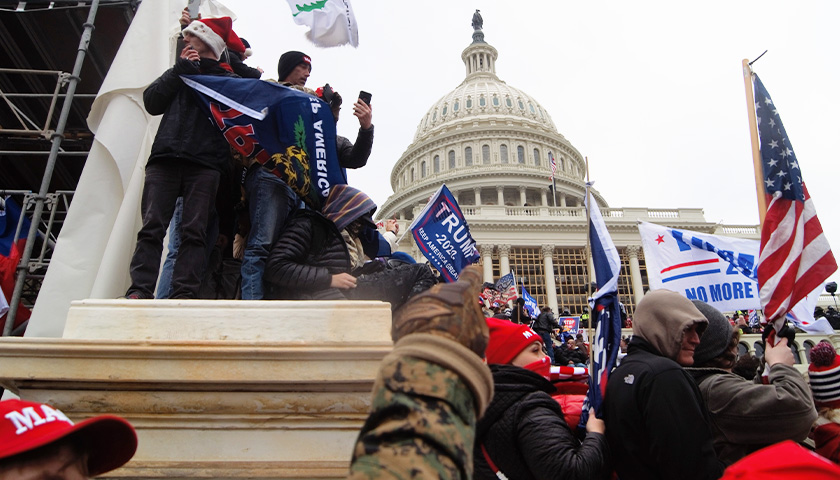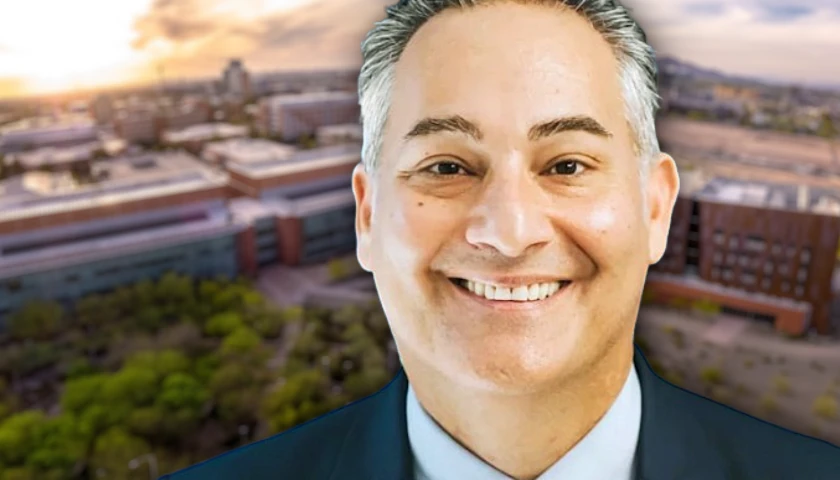by Julie Kelly
A Massachusetts man on Friday was charged with a felony related to his participation in the protest at the Capitol on January 6, 2021. Mark Sahady already faced misdemeanors for his nonviolent and brief jaunt through the building that afternoon, but the Justice Department decided to add the common “obstruction of an official proceeding” charge to Sahady’s case on April 7.
That same day, the U.S. Court of Appeals for the District of Columbia threw Sahady—and more than 300 January 6 defendants charged with the same obstruction felony—a potential lifeline. In what one judge described as a “splintered decision,” a three-judge panel narrowly reversed a lower court ruling that tossed the obstruction count against three Capitol protesters. D.C. District Court Judge Carl Nichols dismissed the charge last year largely based on the argument that the statute “requires that the defendant have taken some action with respect to a document, record, or other object in order to corruptly obstruct, impede or influence an official proceeding.”
A fair reading of the law proves Nichols is correct. Passed in 2002 in the wake of the Enron scandal as part of the Sarbanes-Oxley Act, section 1512(c)(2) closed a legal loophole related to evidence tampering. The law applies to “whoever corruptly . . . otherwise obstructs, influences, or impedes any official proceeding, or attempts to do so.” It’s a crime punishable by up to 20 years in prison.
When he signed the bill into law in 2002, President George W. Bush, as I explained here, noted that the word “corruptly” would compel the government to prove a defendant’s “criminal state of mind” and the overall provision must not infringe “on the constitutional right to petition the Government for redress of grievances.”
But that hasn’t prevented Attorney General Merrick Garland from weaponizing the statute in exactly that way for more than two years. Dozens of defendants have pleaded guilty or been convicted at trial. Jacob Chansley, the “QAnon Shaman,” spent months in solitary confinement and was denied bail before Garland’s prosecutors successfully tormented him into pleading guilty to obstruction. Judge Royce Lamberth, who repeatedly denied his release, sentenced Chansley to 41 months in prison.
Judge Trevor McFadden repeatedly denied the release of Timothy Hale, a January 6 protester who faced the obstruction count and assorted misdemeanors. Hale spent 16 months in the D.C. gulag under McFadden’s pretrial detention orders before finally going to trial in May 2022. He was convicted by a D.C. jury in a matter of hours and is now serving out a 48-month prison sentence.
When Matthew Perna discovered the government would seek years in federal prison after he pleaded guilty to the obstruction charge, he hanged himself in his garage in February 2022.
In fact, every judge on the D.C. District Court has uniformly denied motions to dismiss the obstruction charge. So when Nichols courageously bucked his colleagues’ groupthink, the Justice Department appealed. Oral arguments were presented in December. Nicholas Smith, currently defending Ethan Nordean in the Proud Boys seditious conspiracy trial, represented the January 6 defendants in the appeal.
At the very least, the clear-as-mud opinion handed down by the appellate panel underscores the conformity, if not sheer laziness, of the district judges’ arguments. The 107-page order takes a number of legal twists and turns before reaching what is essentially three different opinions.
In reversing Nichols’ order, Judge Florence Pan, appointed to the appellate bench by Joe Biden in March 2021, concluded that “the meaning of the statute is unambiguous.” Pan explained why the charge should stick—at least in the cases of the three defendants named in the appeal who also face assault charges.
“The statutory definition of ‘official proceeding’ under 1512(c)(2) includes a ‘proceeding before the Congress,’” Pan wrote. “Although [January 6 defendants] strain to argue that the Electoral College vote certification is not a ‘proceeding before the Congress’ because it does not involve ‘investigations and evidence,’ we see no such limit in the ordinary meaning of the word ‘proceeding.’”
Pan admitted that “outside of the January 6 cases brought in this jurisdiction, there is no precedent for using 1512(c)(2) to prosecute the type of conduct at issue in this case.” In other words—before the four-hour disturbance at the Capitol that only briefly delayed a ceremonial congressional function—in its 20-year history, the law had never before been used to prosecute political protest.
Nonetheless, she confidently concluded that “restraint and lenity therefore have no place in our analysis.”
Much of the controversy in the opinion centered on the legal interpretation of the word “corruptly.” Judge Justin R. Walker, a Trump appointee, added a detailed caveat to his partial concurrence. “If I did not read ‘corruptly’ narrowly, I would join the dissenting opinion,” Walker explained. “I would give ‘corruptly’ its long-standing meaning. It requires a defendant to act ‘with an intent to procure an unlawful benefit either for himself or for some other person.’ Because I read ‘corruptly’ as courts have read it for hundreds of years—and only because I read it that way—I concur in the Court’s judgment.”
And therein lies the big headache for the Justice Department. What, for example, was the “unlawful benefit” Chansley sought during his peaceful walk through the Capitol on January 6? Or Matthew Perna’s? Or Mark Sahady’s?
Judge George Katsas, also appointed by Trump, in his 43-page dissent, attempted to force the government to answer those questions. “Document destruction readily conjures up images of corporate fraud,” Katsas wrote. “Advocacy, lobbying, and protest do not. For that matter, neither does assaulting police officers or rioting in the Capitol.”
Katsas further noted the Justice Department’s novel use of the statute. “1512(c)(2) has been on the books for two decades and charged in thousands of cases—yet until the prosecutions arising from the January 6 riot, it was uniformly treated as an evidence-impairment crime,” Katsas wrote. “[Until] the January 6 prosecutions, courts had no occasion to consider whether it sweeps more broadly, because all the caselaw had involved conduct plainly intended to hinder the flow of truthful evidence to a proceeding.”
Katsas pointed to sentencing similarities to show how obstruction of an official proceeding is comparable to evidence destruction crimes rather than disrupting a government function.
“For example, picketing, parading, or using a sound truck to influence a proceeding carries a one-year maximum penalty,” Katsas wrote. “Using threats or force generally carries a maximum penalty of either 5 or 10 years, depending on whether the proceeding is before a court, an agency, or Congress. And destroying, manipulating, or falsifying evidence carries a maximum penalty of 20 years.” That is the same potential sentence for the obstruction felony.
In fact, the misdemeanor resulting in the most plea agreements in the January 6 prosecution is “parading” in the Capitol, a petty offense punishable by up to six months in jail.
While most of the corporate news media cheered the messy outcome as a win for the Justice Department, the government certainly knows better. Defense attorneys in the ongoing Proud Boys trial, which should conclude this week, filed motions to dismiss the obstruction counts against their clients or at least force the court to use Walker’s narrow definition of “corruptly” in jury instructions.
Carmen Hernandez, public defender for Zachary Rehl, a member of the Proud Boys, emphasized the perplexing nature of the appellate court’s ruling. “With all due respect to the Circuit Judges, it is extraordinary that Judge Pan and Judge Walker each assert that their opinion controls while disagreeing on the essential issues in the case. The result is an extraordinarily confusing decision that creates more vagueness than it resolves.”
Nicholas Smith argued that “the section as a whole, related statutes, canons of construction, and statutory history all run contrary to the government’s unprecedented argument that 1512(c) reaches acts that have no connection to evidence impairment.”
The Justice Department intentionally exploited the statute’s vague language while ignoring its context, and the D.C. District Court, with the exception of Judge Nichols, allowed it for more than two years. More than 300 individuals—many of whom committed no violent crime—now stand in the middle of a legal and judicial quagmire created by prosecutors and judges in the nation’s capital as the matter almost certainly winds its way to the Supreme Court.
True justice will only be served when gutless judges on the district court finally start to toss this bogus charge or the higher court delivers a well-deserved smackdown in a final decision. It is, of course, too late to save those defendants whose lives have been destroyed (or ended) over the Justice Department’s dishonest and vengeful use of this law.
– – –
Julie Kelly is a political commentator and senior contributor to American Greatness. She is the author of January 6: How Democrats Used the Capitol Protest to Launch a War on Terror Against the Political Right and Disloyal Opposition: How the NeverTrump Right Tried―And Failed―To Take Down the President. Her past work can be found at The Federalist and National Review. She also has been featured in the Wall Street Journal, The Hill, Chicago Tribune, Forbes, and Genetic Literacy Project. She is the co-host of the “Happy Hour Podcast with Julie and Liz.” She is a graduate of Eastern Illinois University and lives in suburban Chicago with her husband and two daughters.
Photo “January 6” by Tyler Merbler. CC BY 2.0.








